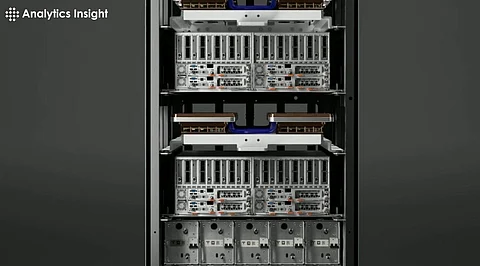

Tesla’s Dojo supercomputer is the driving force behind the move toward self-driving cars. Handling vast amounts of data sharpens the intelligence of Tesla vehicles with each update. The more data it handles, the closer we get to fully autonomous vehicles.
Dojo is what powers Tesla’s self-driving tech, learning from real-time data and improving with every update. As it processes more information, the cars get better at driving themselves.
In short, Dojo is bringing Tesla closer to a future where driving becomes unnecessary. It’s propelling the shift toward fully autonomous vehicles.
Dojo, Tesla’s supercomputer, processes vast data flows, enhancing the intelligence of their autonomous vehicles.
Each Tesla collects real-time data, such as traffic, pedestrians, and road conditions, but its true worth is realized only after it’s swiftly processed. Dojo steps in to manage this data, turning it into valuable information that powers Tesla’s self-driving systems. The more data Dojo processes, the more intelligent the cars become, advancing us toward full autonomy.
Tesla’s cars get smarter with every update by using real-time data.
As Tesla cars drive, they gather information to improve their driving. This data is sent to Dojo, which processes it quickly and efficiently. Whether it’s interpreting road conditions, traffic flow, or predicting pedestrian movements, Dojo handles it all. Each new piece of data sharpens Tesla's systems, bringing the vehicles one step closer to full autonomy.
While others use a bunch of sensors, Tesla’s sticking to cameras and advanced software, and it’s working.
Most self-driving car companies rely on a mix of sensors, radar, lidar, cameras, and more. But Tesla is doing things differently. They believe that cameras alone, with the right software, can do the job just as well, if not better. Think of it as driving the way we humans do, by seeing and reacting to the world around us. Dojo helps process all the camera data, allowing Tesla cars to improve continuously in understanding their environment.
Tesla’s custom D1 chip gives Dojo the muscle it needs to handle all that data.
Tesla’s Dojo goes beyond the ordinary, powered by the D1 chip created specifically for its purpose. With the advantage of making its own chips, Tesla has full control over the system, optimizing efficiency. The D1 chip processes Tesla’s camera data in real-time, enabling swift decisions that improve the car’s self-driving capabilities, making it both faster and safer.
Dojo isn’t merely advancing self-driving cars; it's also shaping the intelligence of Tesla’s humanoid robot, Optimus.
Like its role with the vehicles, Dojo processes immense data streams, enabling Optimus to interpret and engage with the world around it. Through this continuous data flow, the robot learns to understand its environment and respond intelligently, becoming more capable with each interaction. This expansion of Dojo’s capabilities could be huge, not just for cars, but for robotics and automation as well.
Running a supercomputer is no small feat. Expanding Dojo to meet growing demands is costly and tricky.
As Tesla’s fleet of cars grows, so does the amount of data. Dojo’s got to keep up, and that’s a lot to handle. Scaling up means more processing power, more storage, and more money. The investment is considerable, but the rewards are worth it. If Tesla perfects Dojo, it could lead to fully autonomous cars and robots that evolve and adapt to their environment, potentially reshaping the entire industry.
Tesla might offer Dojo’s processing power to other companies; thinking of it as renting out supercomputer time.
Tesla’s not stopping with just using Dojo for its own needs. Looking ahead, Tesla could extend Dojo’s power to other businesses, much like AWS does with cloud computing. Companies could tap into Dojo for processing massive data or training machine learning models, which could open up an entirely new revenue stream for Tesla. It’s a savvy strategy that could place Tesla at the cutting edge of high-performance computing.
Dojo is the engine that’s driving Tesla’s self-driving and robotics innovations.
Tesla’s future is built on the foundation that Dojo provides. It’s not just about making self-driving cars smarter; it’s about building a new era where cars and robots can think for themselves. Dojo is the key to making all of this happen, processing data faster and smarter to create better technology. As Tesla continues to push the boundaries of what’s possible, Dojo will be the powerhouse powering its next big leap.
